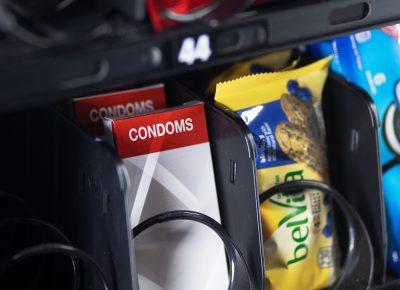
Boston University’s Students for Reproductive Freedom will unveil the University’s first emergency contraceptive vending machine next Tuesday in the basement of the George Sherman Union.
The vending machine will sell Plan B for $7.25, with other products potentially being added in the future.
“We wanted to find a way to have low-cost emergency contraceptives available to all students when they need it,” said Molly Baker, SRF co-president and senior in the College of Arts and Sciences.
The project, five years in development, is being launched with the aid of Boston Planned Parenthood, Sexual Assault Response and Prevention Center and BU Facilities, Baker said.
Plan B can be purchased for $25 at Student Health Services and for $40-50 at local pharmacies and Planned Parenthood. BU students covered by SHIP can access Plan B free of charge.
Baker said the goal of this project is to make accessing emergency contraceptives easy and affordable for BU students.
“It was really important to have an accessible place to get emergency contraceptives,” Baker said. “As nice as it is to be able to have Plan B … from places like SHS and Planned Parenthood, it is something that is very time-sensitive and a lot of people can’t get appointments.”
Emergency contraceptives are used to prevent pregnancies up to five days after unprotected sex, as detailed by Planned Parenthood’s website. The product is designed to be more effective the sooner it is used.
CAS senior Charlotte Beatty, co-president of SRF, said the machine will remove many barriers surrounding emergency contraception, such as needing to see a health care provider.
“There’s obviously a lot of stigma and shame, unfortunately, about seeking out reproductive health care, like contraceptive materials, in public,” Beatty said. “This is a relatively discreet and easy way for people to access Plan B as soon as they need it, which is really fantastic.”
CAS senior Karolena Salmon said purchasing Plan B in a store can be “uncomfortable” as some stores keep it in a locked case or behind the counter.
“Having something like that is more accessible on campus and less of the stigma because you’re not going to a person and buying something,” she said. “I think it’ll be really helpful for students on campus, regardless of people’s sexual orientation or sex or who they are with.”
About one in four women between the ages of 15 to 49 reported using some form of emergency contraception in 2019, according to statistics compiled by the National Survey of Family Growth.
“I think it is a good idea. It makes Plan B a more affordable and easier option for people, which allows for safer sex, which is good,” said CAS freshman Eric Gao.
Since Plan B is a pharmaceutical drug, there are a lot of logistical details — such as restocking the machines — that go into selling it in a vending machine. SRF worked with SHS to make it possible, Beatty said, noting the help from Karen Molloy, SHS director of finance and administration.
Beatty also added that SRF received funding for the machine through its affiliation with Planned Parenthood.
The club is a Planned Parenthood Action Group — an initiative that funds college organizations that work towards reproductive justice and action.
“It definitely feels like we’ve come full circle,” Beatty said. “When I joined SRF as a freshman, it was an idea that e-board was talking about. So it’s been something that’s been in the works for, truly, five years.”
Nathan Brewer, director of the SARP, wrote in an email that SARP assisted in “facilitating the transfer of funds” SRF received from Planned Parenthood.
Brewer added survivors of sexual assault face barriers to getting emergency contraception through conventional means. These normally include taking a physical exam that collects evidence of the assault and meeting with their healthcare provider or a pharmacy.
“A vending machine with contraception means that a survivor doesn’t have to disclose their experience or that they are seeking the medication,” Brewer wrote.
With all the support the SRF has received, Baker said it means a lot that the project is opening while she is co-president of SRF.
“There have been a lot of people who have been really important role models in my life and really important people in my life who worked really hard on it before us,” Baker said. “I’m really happy to be able to do this for the people who came before us.”






















































































































